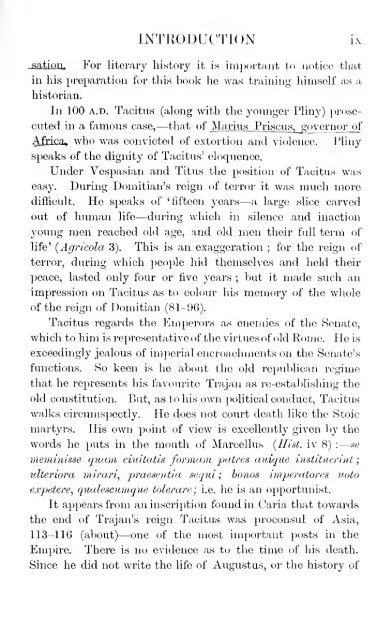You also want an ePaper? Increase the reach of your titles
YUMPU automatically turns print PDFs into web optimized ePapers that Google loves.
INTRODUCTION ix<br />
sation. For literary history it is impoi'tant to notice that<br />
in his preparation for this book he was training himself as a<br />
historian.<br />
In 100 A.D. <strong>Tacitus</strong> (along with the younger Pliny) ])rose-<br />
cuted in a famous case,—that <strong>of</strong> Marius Priscus, jiovernor <strong>of</strong><br />
Africa, who was convicted <strong>of</strong> extortion and violence. Pliny<br />
speaks <strong>of</strong> the dignity <strong>of</strong> <strong>Tacitus</strong>' eloquence.<br />
Under Vespasian and Titus the position <strong>of</strong> <strong>Tacitus</strong> was<br />
easy. During Domitian's reign <strong>of</strong> terror it was much more<br />
difRcidt. He speaks <strong>of</strong> 'fifteen years—a large slice carved<br />
out <strong>of</strong> human life—during which in silence and inaction<br />
young men reached old age, and old men their full term <strong>of</strong><br />
life' [Agricola 3). This is an exaggeration ; for the reign <strong>of</strong><br />
terror, during which people hid themselves and held their<br />
peace, lasted only four or five years ; but it made such an<br />
impression on <strong>Tacitus</strong> as to colour his memory <strong>of</strong> the whole<br />
<strong>of</strong> the reign <strong>of</strong> Domitian (81-96).<br />
<strong>Tacitus</strong> regards the Emperors as enemies <strong>of</strong> the Senate,<br />
which to him is representative <strong>of</strong> the virtues<strong>of</strong> old Rome. He is<br />
exceedingly jealous <strong>of</strong> imperial encroachments on the Senate's<br />
functions. So keen is he about the old republican regime<br />
that he represents his favourite Trajan as re-establishing the<br />
old constitution. But, as to his own political conduct, <strong>Tacitus</strong><br />
walks circumspectly. He does not court death like the Stoic<br />
martyrs. His own point <strong>of</strong> view is excellently given by the<br />
words he puts in the mouth <strong>of</strong> Marcellus {Hist, iv 8) :<br />
meminisse quam eiuitatis formam patres auique instituerint<br />
ulteriora mirari, praesentia sequi ; bonos imperatores nolo<br />
expetere, qualescu77ique tolerare; i.e. he is an opportunist.<br />
It appears from an inscription found in Caria that towards<br />
the end <strong>of</strong> Trajan's reign <strong>Tacitus</strong> was proconsul <strong>of</strong> Asia,<br />
113-116 (about)—one <strong>of</strong> the most important posts in the<br />
Empire. <strong>The</strong>re is no evidence as to the time <strong>of</strong> his death.<br />
Since he did not write the life <strong>of</strong> Augustus, or the history <strong>of</strong><br />
—<br />
;<br />
se

















